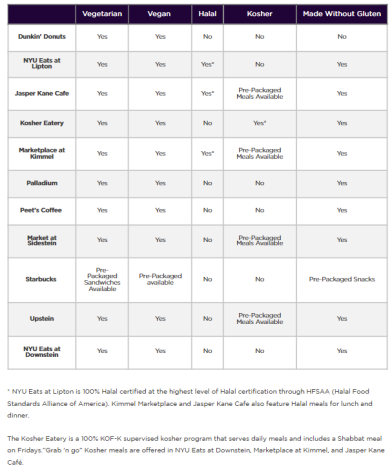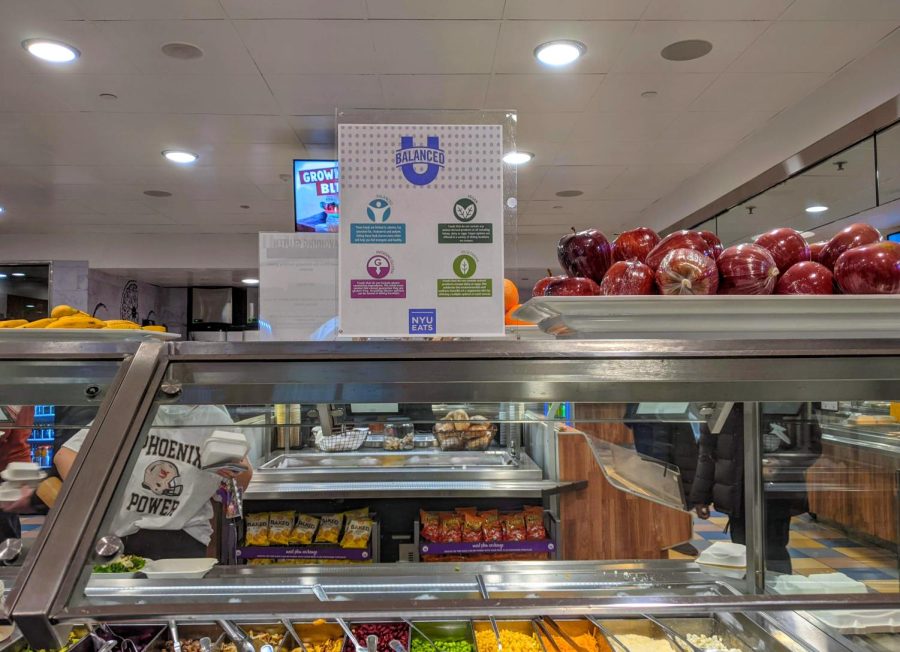(Photo by Noma Mirny)
The unpalatable reality of NYU dining
NYU’s dining halls leave much to be desired for students with dietary restrictions.
February 18, 2022
Googling the closest vegan restaurant near you and only getting two options in a five-mile radius. Eating your pre-portioned, well-balanced meal prep before lunch with friends just in case there’s nothing gluten-free on the menu. Constructing a dinner order that is as complicated as the latest trending TikTok Starbucks drink.
If you have a dietary restriction that requires you to cut certain foods out of your diet, these situations might be familiar to you. On top of all the other pressures you have to juggle in college — academics, social life, well-being — the last thing you want to worry about is finding a proper meal.
On NYU’s Manhattan and Brooklyn campuses, dining halls provide various meal options for certain dietary restrictions. There are only two options available at Brooklyn: Jasper Kane Cafe and Bridgeview Market. If you live in Manhattan, there are more dining halls to choose from. A page on NYU’s website lists dining locations with various dietary options.

At first glance, it seems that NYU has a myriad of options. Each dining facility accommodates at least two dietary restrictions.
The Kosher Eatery at the Weinstein dining hall, for example, is a 100% KOF-K supervised kosher program and includes a Shabbat meal on Friday, while NYU Eats at Lipton is 100% certified through the Halal Food Standards Alliance of America. Jasper Kane Cafe and the Marketplace at Kimmel also feature halal meals for lunch and dinner.
NYU has the foundations of a strong selection of alternative dining options, but the reality of eating at an NYU dining hall leaves much to be desired. Anagha Menon, a pescetarian Tandon first-year, was not dazzled by the chart of NYU dining options.
“Vegetarian options are definitely available but are not the best,” Menon said. “The food will be bland or not cooked great. It’s usually just a repetition of the same dishes: rice, soup or cooked vegetables. There’s also not a lot of seafood options.”
Those seafood options, she added, are often limited to sushi of dubious quality.
“The sushi that I tried was pretty… interesting,” Menon said. “There were saltine crackers with tuna, and that was marketed as the Chef’s Special sushi.”
Students at the Manhattan campus have similar feedback. Mossiah Smith, a vegan Tisch junior, used to frequent Downstein, Palladium and Lipton until this routine became unbearable.
“‘Repetitive’ is the best word you could ever come up with, honestly,” Smith said. “Same food all the time with small variations that certainly needed some sort of seasoning each time. It simply wasn’t enough to feel passionate or useful enough to visit the dining hall.”
Smith faced issues every time he wanted a meal at NYU, and ultimately turned to options outside of the dining halls to have meals that were satisfying and suited his dietary restrictions.
Recently, though, new options have been added to dining halls on both the Washington Square and Brooklyn campuses. New vegan and vegetarian sandwiches are available at Upstein and Palladium, and vegan dressings are available at salad bars. For protein options, NYU Eats has introduced PAOW — a soy-based meat replacement — across all dining halls.
“NYU Dining takes our students’ dietary restrictions very seriously and works hard to ensure that all students have healthy nutritious options in our dining halls,” said Ronni Mandell, a communications director for Campus Services. As for the issue of repetition, Mandell said that having rice, vegetables and legumes as an option every day means that students will have a balanced meal.
While recent measures like menu updates and new food stations are a step, students with dietary restrictions deserve truly diverse and fulfilling options. Allowing a greater degree of student input would go a long way toward improving the dining hall experience for all NYU students.
Contact Aditi Sharma at [email protected]

